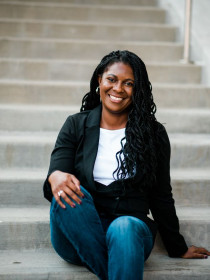
Apryl Alycia Alexander
Connect with Apryl
About Apryl
Alexander's research broadly focuses on violence and victimization, human sexuality, sex offending, social justice and advocacy, and trauma- and culturally-informed practice. She serves as Director of the Forensic Institute of Research, Service, and Training (Denver FIRST) Outpatient Competency Restoration Program and the Juvenile Justice Project. She also serves on the board of directors of the Colorado Juvenile Defender Center.
Contributions
In the News
Publications
Discusses how intersectionality in sex positive research, training, and practice is practically non-existent in psychology. The aim of the present paper is to analyze issues related to sex and sexuality from an intersectional sex positive framework.
Discusses medical evidence and race of victim influence victim believability such that medical evidence was more impactful for cases with African American victims in child sexual abuse cases.
Explores how research has found differences in sexual behavior and types of sexual offending by offense category and racial/ethnic group. The present study examined effects of offense category, victim age, and race/ethnicity on sexual behavior.